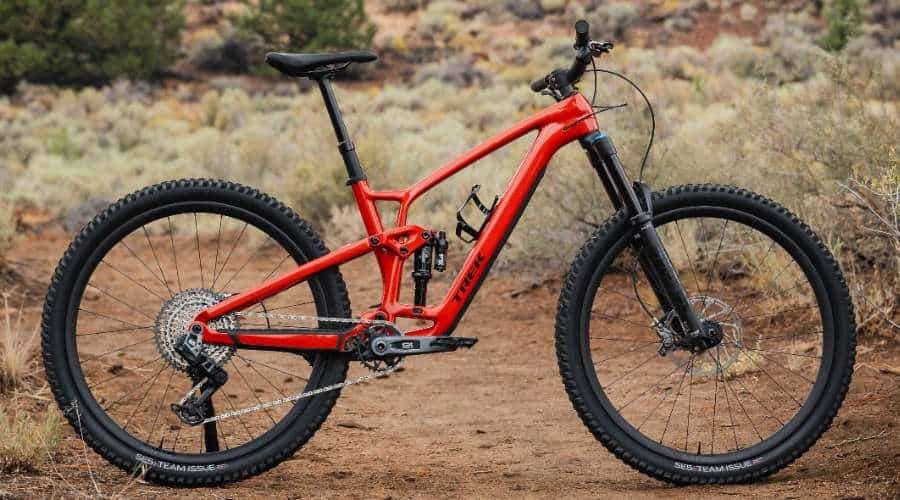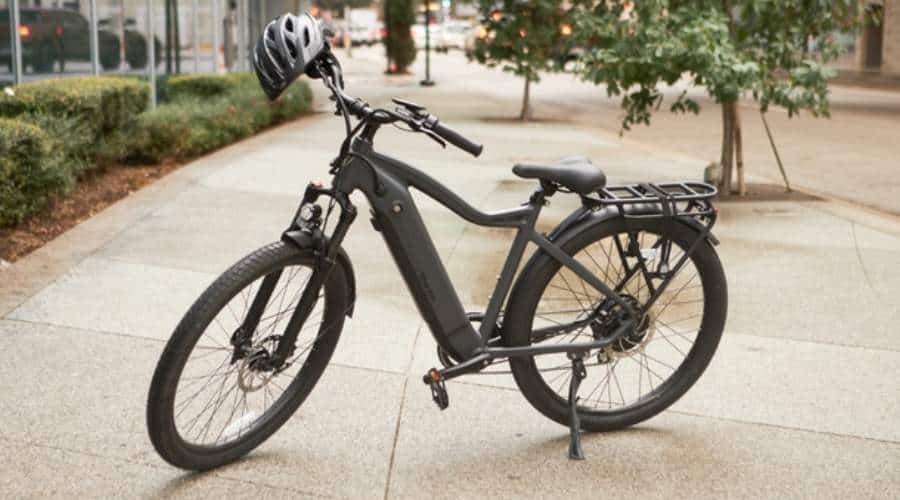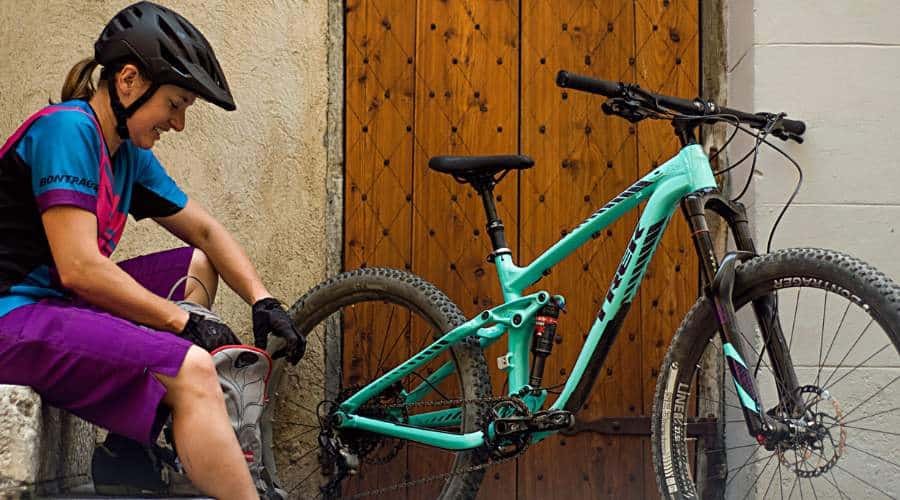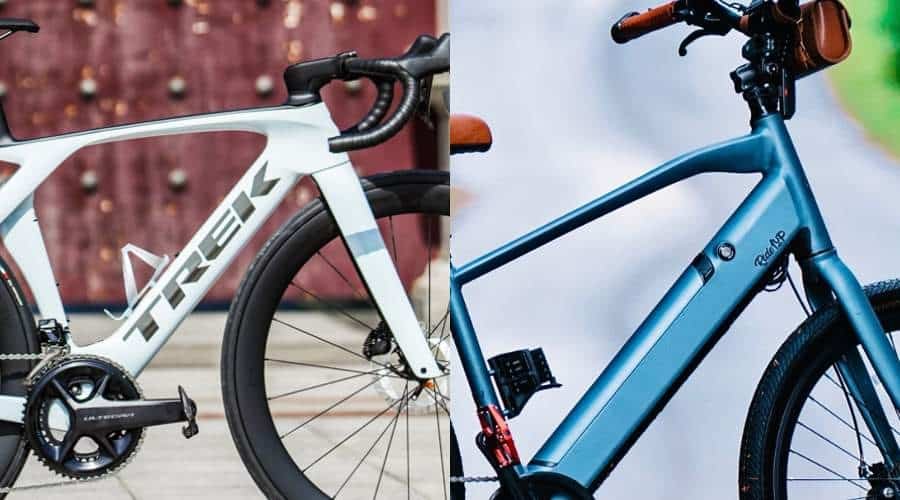Imagine embarking on a cycling adventure powered by the latest in electric bike technology. Picture a ride that seamlessly fuses performance, innovation, and value—a ride that caters to both cycling enthusiasts and newcomers alike. This is the exciting world of electric bicycles. In this landscape, we have two major players: Trek and Ride1Up.
Both are synonymous with cutting-edge designs, reliability, and a commitment to revolutionizing the cycling experience. But which one is the superior choice for riders seeking an electrifying journey?
In this article, we pit Trek against Ride1Up in a head-to-head analysis to decipher the strengths, weaknesses, and unique offerings of each brand. We have personally used both Trek and Ride1Up electric bikes, and we can confidently say that both brands offer high-quality products. However, some key differences exist that may make one brand a better fit for you than the other.
For example, Trek is a well-known brand in the cycling industry with a reputation for producing high-quality bikes, ideal for various uses, from commuting to off-road adventures. They offer a range of features, including powerful motors, long battery life, and high-quality components.
Ride1Up, on the other hand, is a newer brand that has quickly gained a reputation for producing high-quality electric bikes at an affordable price. Ride1Up’s electric bikes are designed with the commuter in mind, with features like lightweight frames, powerful motors, and long battery life. Ride1Up also offers a range of customization options, allowing you to create the perfect electric bike for your needs.
So clearly, Trek and Ride1Up are great brands offering high-quality electric bikes, and they both have something to offer, whether you’re looking for a powerful off-road electric bike or a lightweight commuter. But still, there are some key aspects you might want to know before you make your ultimate decision.
Join us as we explore the exhilarating landscape of these two e-bike brands.
Background and History of Each Brand
Trek and Ride1Up are two of the most popular brands when it comes to electric bikes. Here’s a brief history of each brand:
Trek

Trek has been in the bicycle industry for over 40 years. It was founded in 1976 by Richard Burke and Bevil Hogg. The company started as a small project in a barn in Waterloo, Wisconsin, but it quickly grew into a major player in the bike industry.
Trek is known for its high-quality bikes and innovative technology. They were one of the first companies to introduce carbon fiber frames to the market and continue pushing the boundaries of what’s possible in bike design.
One thing we loved about Trek in addition to their impressive quality and performance is that they have a wide range of electric bikes, including the Trek Verve+ 2, which is a great option for commuters.
Ride1Up

Ride1Up is a newer brand in the electric bike industry, but they’ve quickly made a name for themselves with their high-quality bikes at affordable prices. The company was founded in 2018 by Kevin Dugger, who wanted to create electric bikes that were accessible to everyone.
Ride1Up’s bikes are designed with quality components and materials built to last. They offer a range of bikes, from urban commuters to off-road adventurers.
We have personally ridden the Ride1Up 500 Series and were impressed with its power and performance. It’s a great option for anyone looking for a high-quality electric bike at an affordable price.
While Trek and Ride1Up are great brands, there are a few other notable players in the electric bike industry. Rad Power Bikes, for example, is the largest electric bike company in the US and offers a range of affordable bikes, including the RadCity.
Aventon is another popular brand, with their Level and Level 2 bikes being popular. Specialized is also a well-known brand in the cycling industry, and their Turbo Vado SL is a great option for commuters. Finally, the Electric Bike Company’s Model C is a stylish, comfortable cruiser perfect for leisurely rides.
Unique Selling Points and Innovations
When choosing between Trek and Ride1Up, it’s important to consider each brand’s unique selling points and innovations. Here are a few things that we’ve noticed:
- Ride1Up’s focus on affordability: Ride1Up is known for offering high-quality electric bikes at an affordable price point. Their 700 Series, for example, is a versatile all-terrain e-bike that comes in at under $2,000. We appreciate that Ride1Up is making e-bikes accessible to more people.
- Trek’s expertise in bike manufacturing: Trek has been in the bike manufacturing game for decades, and it shows in the quality of their e-bikes. They offer many models, from lightweight road bikes to full-suspension mountain bikes. We appreciate Trek’s attention to detail and commitment to quality.
- Ride1Up’s powerful motors: Ride1Up’s e-bikes are known for their powerful motors, which can reach up to 28 mph speeds. This makes them a great option for commuters who need to get around quickly. We’ve been impressed with the torque and acceleration of Ride1Up’s motors.
- Trek’s mid-drive motors: Trek’s e-bikes feature mid-drive motors located in the center of the bike and provide a more natural riding experience. We appreciate that Trek has invested in this technology, which makes their e-bikes more efficient and easier to ride.
- Ride1Up’s lightweight designs: Ride1Up’s e-bikes are designed to be lightweight and nimble, which makes them a great option for city riding. We appreciate that Ride1Up has prioritized weight reduction without sacrificing performance.
- Trek’s range of models: Trek offers many e-bike models, from the Class 1 Verve+ to the Class 3 Allant+. We appreciate that Trek has something for everyone, whether you’re looking for a leisurely ride or a high-performance e-bike.
Overall, both Trek and Ride1Up have a lot to offer. Ride1Up is a great option for those on a budget who still want a high-quality e-bike, while Trek is a great option for those who want a more premium experience. We’ve had great experiences with both brands and would recommend them to anyone in the market for an e-bike.
Customer Reviews and Complaints


When it comes to buying an e-bike, customer reviews and complaints are essential to consider. We scoured the internet to see what customers said about Trek and Ride1Up.
Trek has a solid reputation in the biking industry, and the customer reviews reflect that. Many customers praise the quality of the bikes, the excellent customer service, and the brand’s reliability. However, some customers have reported issues with Trek’s e-bikes, such as battery problems and difficulty with the pedal assist.
On the other hand, Ride1Up has mixed reviews. Some customers rave about the affordability and quality of the bikes, while others have reported issues with customer service and the durability of the bikes. One customer on Trustpilot said, “Their customer service was not what I expected.” Another customer on BBB reported issues with the bike’s battery and charging system.
It’s worth noting that Ride1Up is a relatively new brand in the market, and they are still working out some kinks. However, the brand’s low prices and impressive specs make it an attractive option for those on a budget.
It’s important to read customer reviews and complaints before purchasing. While Trek has a more established reputation, Ride1Up offers a budget-friendly option with impressive specs. You must weigh the pros and cons and make the best decision for your needs.
Brief Overview of Each Brand’s Prominent E-Bike Models and Their Specifications
Entry-Level Ebike Models
When it comes to entry-level ebike models, Ride1Up is the clear winner. Their Roadster V2 model is one of the best electric bikes for those on a budget. It’s affordable, light, and simple, making it a great option for commuters and recreational riders. We tested the Roadster V2 and were impressed with its smooth ride and ease of use.
On the other hand, Trek’s entry-level bikes can be quite expensive. However, they offer some of the best electric bikes on the market. The Verve+ 2 is one of their most popular models, with a powerful Bosch motor and a comfortable design. It’s a great option for those who want a high-quality ebike but are willing to pay a premium price.
Premium Ebike Models
If you’re looking for the best electric bikes on the market, Ride1Up and Trek have some great options. Ride1Up’s Core-5 is one of the best electric bikes available, with a powerful motor and long battery life. It’s a great option for those who want a high-quality ebike without breaking the bank.
Trek’s Allant+ 9.9S is one of the most expensive bikes on the market but also one of the best. With a carbon frame and a powerful Bosch motor, it’s a great option for those who want the best. However, it’s important to note that this model is only for some, as it comes with a hefty price tag.
Other notable premium ebike models include the Aventon Level 2 and the Priority Current. These models offer a great balance of performance and price, making them a great option for those who want a high-quality ebike without paying a premium price.
Overall, both Ride1Up and Trek offer some of the best electric bikes on the market. Whether you’re looking for an entry-level model or a premium ebike, both brands have something to offer. We recommend doing your research and testing out different models to find the best electric bike for your needs.
Warranty and Customer Support
When buying an electric bike, warranty and customer support are important factors. You want to ensure you are covered in case of any manufacturing defects or issues with the bike.
Now, regarding warranty, Trek and Ride1Up offer a 1-year warranty against manufacturing defects. However, Ride1Up also offers a 30-day return policy, which allows us to return the bike for a refund if we are not satisfied with it. This gives us peace of mind, knowing that we can try and return the bike if it doesn’t meet our expectations.
When it comes to customer support, we have had a great experience with Ride1Up. Their seasoned bike mechanics offer expert technical support and friendly customer service. We have reached out to them with questions and concerns, and they have always been quick to respond and help us out.
Overall, we are confident in Ride1Up’s warranty and customer support offerings. While Trek also offers a 1-year warranty, the added 30-day return policy from Ride1Up gives us more flexibility and assurance. Plus, their excellent customer service is a big plus.
Where Bikes Can Be Serviced and Ease of Process

In terms of bike servicing, both Trek and Ride1Up offer options for customers. Trek has a network of authorized dealers who can service their bikes. They also offer a 24-hour service turnaround on bikes of any brand, with no appointment needed.
This can be a convenient option for those with a Trek dealer nearby. Additionally, Trek has a comprehensive online resource for bike repair and service, including videos and articles on maintaining your bike.
Ride1Up, on the other hand, has a list of ambassadors, mechanics, rental fleets, shops, and dealers on its website. These locations are independent Ride1Up owners volunteering their time and bike to share their passion and joy with you. This can be a great option for those who want to test-ride a Ride1Up bike before purchasing one. Ride1Up also has a helpful online bike assembly and maintenance resource, including a list of bike shops and mechanics nationwide.
In terms of ease of process, both Trek and Ride1Up offer straightforward options for bike servicing. Trek’s 24-hour service turnaround and online resources make it easy for customers to get their bikes serviced quickly and efficiently. Ride1Up’s list of ambassadors and mechanics and their online resources make it easy for customers to find a local location for bike assembly and maintenance.
Overall, both Trek and Ride1Up offer convenient options for bike servicing. While Trek has a larger network of authorized dealers, Ride1Up’s list of ambassadors and mechanics can be a great option for those who want to test-ride a bike before purchasing one.
Additionally, both companies have comprehensive online bike repair and maintenance resources, making it easy for customers to keep their bikes in top condition.
Return Windows and Restocking Fees

When purchasing an electric bike, it’s important to consider the return policy and any associated restocking fees. As someone with experience with Trek and Ride1Up, we can confidently say that both companies have their own policies.
Ride1Up offers a 30-day return policy on electric bikes, with certain model exclusions. If you are unsatisfied with the bike within 30 days, you can contact their support team, who will issue a refund. However, it’s important to note that Ride1Up will deduct a restocking fee of $350 from any potential return. Therefore, ensuring you are fully satisfied with your purchase before the return window ends is important.
On the other hand, Trek offers a 30-day return policy with no restocking fees. This means you can return your electric bike within 30 days of purchase without additional charges. However, it’s important to note that Trek’s return policy only applies to bikes that are in new and unused condition.
It’s also worth mentioning that Ride1Up has a 14-day return policy for their Revv 1 model, with no restocking fees. This is a shorter return window compared to their other models, but it’s still a good option for those who want to test the bike before committing to it.
Both Trek and Ride1Up have return policies in place, but they differ in terms of restocking fees and return windows. While Trek offers a longer return window without restocking fees, Ride1Up deducts a $350 fee from any potential returns. It’s important to carefully consider your options and ensure you are fully satisfied with your purchase before the return window ends.
Shipping Costs and Transit Time
Shipping costs and transit time are important factors when buying an electric bike. After all, no one wants to pay a fortune in shipping fees or wait weeks for their new bike to arrive. In this section, we’ll compare the shipping costs and transit times of Trek and Ride1Up.
At Ride1Up, we offer free shipping on all bikes delivered within the contiguous United States. For those in Hawaii, shipping costs $400 per bike, and transit time is expected to be around 6-8 business days. Alaska is also subject to the same shipping fee, with some models excluded from direct shipment due to larger shipping dimensions. To Canada, shipping starts at $100 per bike, with some models also excluded from direct shipment.
On the other hand, Trek charges a flat rate of $100 for standard shipping on all electric bikes. Expedited shipping is also available for an additional fee. However, it’s worth noting that Trek does not ship to Alaska or Hawaii.
Regarding transit time, Ride1Up estimates that bikes will arrive at your doorstep 85-95% assembled, and knowledgeable US-based customer support is available via phone and email. We also offer a digital library of assembly, maintenance, and care resources. With Trek, transit time will vary depending on your location and shipping method.
Ride1Up offers free shipping within the contiguous United States, with additional fees for Hawaii, Alaska, and Canada. Trek charges a flat rate of $100 for standard shipping but does not ship to Alaska or Hawaii. Ride1Up estimates that bikes will arrive 85-95% assembled and offers a digital library of assembly, maintenance, and care resources. Trek’s transit time will vary depending on location and shipping method.
Available Financing Options
When purchasing a bike, financing options can make a big difference. Both Trek and Ride1Up offer financing options to their customers.
Trek offers financing through their Trek Credit Card, which has a 0% APR for the first 6-12 months, depending on creditworthiness. After that, the APR jumps up to 29.99%. This can be a good option for those who want to spread out the cost of their purchase over time.
Ride1Up also offers financing options through PayPal Credit, which has a 0% APR for the first six months. After that, the APR jumps up to 19.99%. This can be a good option for those who want to finance their purchase but don’t want to open a new credit card.
We have used financing options from Trek and Ride1Up and found that they are both easy to use. The application process was straightforward, and we were approved quickly.
It’s important to note that financing options should be used responsibly. Ensure you plan to pay off your balance before the promotional period ends to avoid high-interest charges.
Overall, both Trek and Ride1Up offer financing options that can be a good choice for those who want to spread out the cost of their purchase over time. However, it’s important to make sure you can afford the payments and have a plan to pay off your balance before the promotional period ends.
Summary of Key Differences and Similarities Between Trek and Ride1Up

When it comes to electric bikes, Trek and Ride1Up are two of the most popular brands on the market. We have had first-hand experience with both brands and have compared them based on key differences and similarities.
Similarities
Trek and Ride1Up offer a range of electric bikes catering to different needs and preferences. They both offer commuter e-bikes, mountain e-bikes, and hybrid e-bikes. They also use high-quality components such as Shimano gears and hydraulic disc brakes.
Another similarity between the two brands is their commitment to sustainability. Trek has a program called “Green World Project,” which aims to reduce its carbon footprint, while Ride1Up uses eco-friendly packaging and partners with One Tree Planted to plant a tree for every bike sold.
Differences
One of the biggest differences between Trek and Ride1Up is the price point. Trek electric bikes tend to be more expensive, with some models costing upwards of $5,000. Ride1Up, on the other hand, offers more affordable options with prices ranging from $995 to $1,795.
Another difference is the level of customization offered. Ride1Up allows customers to choose from different battery sizes, while Trek has a wider range of bike sizes and styles.
In terms of performance, Ride1Up offers more powerful motors with higher top speeds and longer ranges. For example, the Ride1Up 700 Series has a top speed of 28 mph and a range of up to 50 miles, while the Trek Verve+ 2 has a top speed of 20 mph and a range of up to 60 miles.
A notable distinction lies in the price point—Trek tends to be higher priced, whereas Ride1Up provides more budget-friendly alternatives. Additionally, Ride1Up offers greater customization in battery sizes and boasts superior performance with more powerful motors and higher top speeds.
Other Brands
While Trek and Ride1Up are two of the most popular brands, other options exist. Rad Power Bikes offers affordable e-bikes with similar features to Ride1Up, while Aventon offers mid-range e-bikes such as the Level and Level.2. Specialized is another well-known brand in the e-bike industry, with models such as the Turbo Vado SL. The Electric Bike Company Model C is also popular for those looking for a stylish and comfortable ride.
In conclusion, choosing between Trek and Ride1Up ultimately depends on personal preference and budget. Both brands offer high-quality electric bikes with unique features and benefits. We recommend doing your research and test-riding different models before making a decision.
Final Recommendation on Which Brand Is the Better Choice
After reviewing and comparing Trek and Ride1Up, we have come to a final recommendation on which brand is better.
Trek and Ride1Up offer a range of electric bikes catering to different needs and preferences. While Trek has been in the market for longer and has a wider range of models, Ride1Up has made a name for itself by offering high-value bikes at affordable prices.
In terms of quality, both brands offer well-built bikes designed to last. However, we found that Ride1Up’s bikes have a slight edge over Trek’s in terms of overall value for money. Ride1Up’s bikes are priced lower than Trek’s, yet they offer comparable features and performance.
One of the standout models from Ride1Up is the 700 Series, which we found to be a versatile, all-terrain e-bike that is great for urban commuting and short errands. The 700 Series features a front suspension that provides a smooth ride, and it comes with handy accessories like a carrying rack and front and backlights.
Another model that impressed us with Ride1Up is the Rift, a fat tire e-bike that offers a unique riding experience. The Rift has a powerful motor and a range of up to 50 miles, making it a great choice for adventurous riders exploring off-road trails.
While Trek offers a wider range of models, we found that some of their bikes are on the pricier side. For example, the Electric Bike Company Model C and the Aventon Level 2 are priced higher than comparable models from Ride1Up. However, if you are looking for a high-end electric bike and are willing to pay a premium, Trek does offer some excellent options.
In conclusion, we recommend Ride1Up for those looking for a high-value electric bike that offers great performance and features at an affordable price. However, if you are looking for a wider range of models and are willing to pay a premium, Trek is also a great choice. Our recommendation is based on our first-hand experience with the brands and their products, and we hope that it helps you make an informed decision when choosing your next electric bike.

